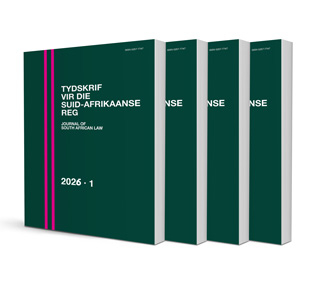’n Stap in die regte rigting ten opsigte van onuitgevoerde kontrakte in ondernemingsredding?

REGSPRAAK
’n Stap in die regte rigting ten opsigte van onuitgevoerde kontrakte in ondernemingsredding?
Author: Jacobus Jan Louw Nieuwoudt
ISSN: 1996-2207
Affiliations: Stadio Higher Education
Source: Tydskrif vir die Suid-Afrikaanse Reg, Issue 1, 2026, p. 197-206
https://doi.org/10.47348/TSAR/2026/i1a12
Abstract
For a long time, executory contracts in business rescue have been a contentious legal issue, particularly regarding how the section 133 moratorium and the concept of lawful possession of property affect their treatment before the courts. The moratorium was introduced to protect the company during the rehabilitation process of business rescue proceedings and confers protection against legal proceedings and enforcement action so that the business rescue practitioner could manage the company’s affairs and enable the company to function again as a going concern.
Until the decision in Capitec Bank Limited v Ubuntu Family Health Centre Grayston (Pty) Ltd the prevailing legal position was that cancellation of a contract would cause the company no longer to be in lawful possession of the relevant property. Section 133 of the Companies Act 71 of 2008 provides that the moratorium protecting the company during business rescue proceedings applies only to property that is in the lawful possession of the company. The protection therefore does not extend to property that the company possesses unlawfully or without valid title.
Unfortunately, section 133 of the Companies Act has in certain cases had adverse implications for companies. If a counterparty was entitled to cancel a contract due to breach, that party could institute enforcement actions and reclaim its property – thereby effectively circumventing the protection envisaged by section 133.
The Capitec decision has shed new light on this area of law and points to an expected change in how the courts will interpret “lawful possession”. According to this judgment, cancellation of an executory contract may no longer result in the company being in unlawful possession of the property. This discussion is one of the first to analyse the high court’s redefinition of “lawful possession” under section 133 of the Companies Act, signalling a shift in South African business rescue law. The case note also examines in depth the implications of this landmark decision.
Earlier case law equated the cancellation of a contract with unlawful possession, thereby limiting protection by the moratorium. The court now confirms that possession is unlawful only if criminal unlawful possession is prevalent and no longer civil unlawful possession. This strengthens the moratorium, enabling business rescue practitioners to use company assets effectively while formulating a rescue plan. The decision aligns South Africa more closely with the debtor-friendly model used in the United States of America, rather than the creditor-oriented approaches of Germany and Australia and creates a more balanced framework that gives distressed companies a fair chance to rehabilitate.
The decision makes an important contribution to business rescue law, extending its reach to instalment and potentially lease agreements. However, courts must carefully balance debtor protection with contractual certainty. In Capitec Bank Limited v Ubuntu Family Health Centre Grayston (Pty) Ltd (2023/127918) 2025 ZAGPJHC 304 (19 March 2025) leave to appeal the decision to the supreme court of appeal was granted. The outcome of that appeal was still being awaited at the time of finalisation of this note.

